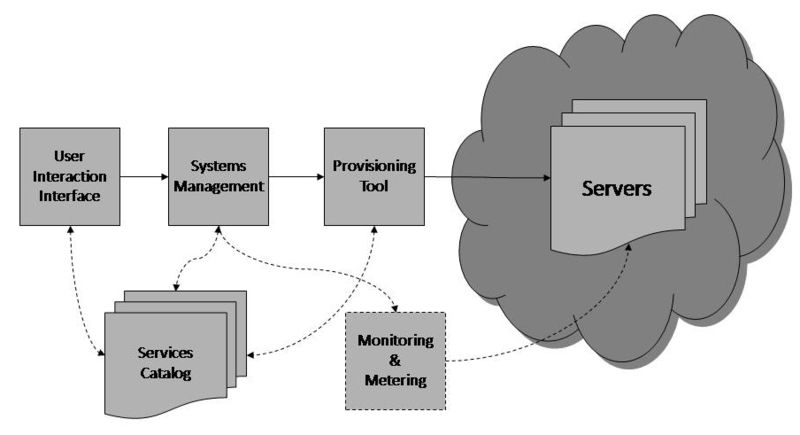[ Milan Stojanovic @ 12.02.2008. 22:50 ] @
| Može li mi neko reći nešto više o ovome? Računarski oblaci - šta je to i na koji način radi? Ovo su tekstovi koji me potaknuše na razmišljanje Citat: Reč je o novom terminu i novom konceptu: takvoj kombinaciji kompjuterskog hardvera, softvera, ekspertize i onlajn usluga, koja umesto pojedinačnog kompjuterskog centra podrazumeva korišćenje na stotine hiljada računara rasutih širom sveta, a međusobno umreženih brzim internet vezama. Tako se dobija snaga superkompjutera i otvaraju novi horizonti za povećanje nivoa usluga – i profita. Gugl ovaj princip praktično primenjuje od svog nastanka: on svoje usluge isporučuje uz pomoć „farmi računara”: pretragu interneta obavlja uz pomoć velikih „guglpleksa” koji se sastoje od mnogo običnih, stonih pi-si računara, koji nisu skupi, a uz to su lako zamenljivi, čija se procesorska moć kombinuje tako da korisnicima omogućava da trenutno dođu do željenih informacija u beskrajnom rudniku interneta. To plaćaju oglašivači: uz svaki rezultat pretraživanja pojavljuju se diskretni oglasi koji su relevantni za predmet interesovanja korisnika. Za „kompjuterske oblake” zainteresovan je i Aj-Bi-Em, koji je nedavno u Šangaju predstavio svoj „plavi oblak”, koji će bankama i drugim klijentima omogućiti da preko interneta dobiju brže i preciznije finansijske analize, upošljavanjem velikog broja računara. Snaga superkompjutera dosad je inače bila dostupna samo vojskama, obaveštajnim službama (analiza podataka dobijenih sveobuhvatnim prisluškivanjem), univerzitetima i velikim istraživačkim laboratorijama. „Kompjuterski oblaci” to sada čine pristupačnim i „masama”. http://www.politika.co.yu/rubr.../Kompjuteri-u-oblacima.sr.html Citat: Five Computer Clouds Are All We Need This is a famous misquote attributed to Thomas J. Watson Sr., then-president of IBM, in an apparent misjudgment of the PC market’s potential. As the story goes, under Watson’s leadership, IBM — which invented the PC — didn’t have a vision as to how big the market could become and let others, especially Microsoft, get the lion’s share of the value creation. But maybe five computers are all we need. My friend Ray Conley, of Palo Alto Investors, made a good case over lunch one day that the statement could indeed be true if you think of the computer in the cloud sense. Could five computer “clouds” really allow us to do everything we want? The answer is yes, and they can already be found with Google; Amazon; Salesforce.com; either Sun Microsystems or VMWare; and Akamai. First up is Google (GOOG), for consumer apps. Google can not only take care of all our email, social networking, sharing and blogging needs, but has the means to offer these apps online. Incidentally, Facebook can offer all of these apps as well, save for search. A 2008 prediction could be that they actually do something big on the search front, but I digress. Next up is Amazon (AMZN) — not for their ecommerce solutions, but for their web services, which I’ve previously compared to semiconductor fabs. They represent the consumer infrastructure cloud. Any consumer Internet app first needs to be hosted somewhere, whether it be on Google or Facebook. Very few companies have the ability to build a big, global data center, but Amazon has one you can use, and pay for by the byte. With the consumer apps and infrastructure clouds covered, let’s turn to the enterprise side. After all, anybody in front of a PC looks either like an employee or a consumer. No. 3, therefore, is Salesforce.com (CRM). Just as Google gives you your consumer apps, Salesforce gives you your enterprise apps. Their cloud takes care of all the things you need to get your job done. And just like Google, they are open to third parties who will develop on their platform. The fourth slot belongs to the enabler of the enterprise infrastructure via control of servers, storage, etc. The owner of this cloud is nebulous. Sun Microsystems (JAVAD) has products and solutions for backend infrastructure, while VMWare is taking care of servers on the front end. I am leaning towards VMWare (VMW), but there is a good case to be made for Sun as well. You take your pick. The final spot is reserved for the one that gets all the bits to you — the cloud that has the intelligence to move things around. None of the other four work without it. It’s a CDN, and is best represented by Akamai (AKAM). There you have it. If these companies could completely dominate their spaces, and kill every competitor, you’d be fine doing what you are doing on only five clouds. http://gigaom.com/2007/11/22/f...mputer-clouds-are-all-we-need/ http://www.ignitepr.com/blog/2...r-clouds-are-rolling-in-again/  |
